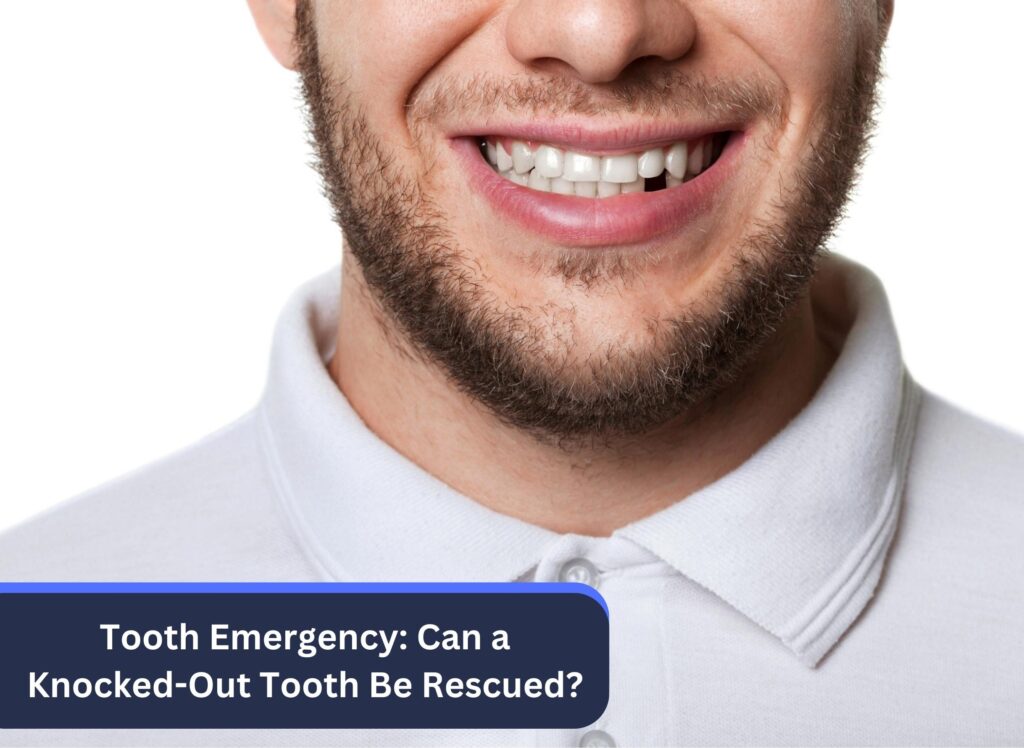A dental emergency can be a stressful and painful experience, especially when a tooth gets knocked out. It’s crucial to act quickly, remain calm, and know what steps to take when faced with such a situation. At Thind Dental Clinic in Ludhiana, we understand the urgency of dental emergencies, and we’re here to provide you with the essential information and guidance you need to potentially save a knocked-out tooth.
Understanding the Severity
The first thing to consider when dealing with a knocked-out tooth is understanding the severity of the situation. Not all knocked-out teeth are the same, and the chances of successfully saving a tooth depend on various factors:
1. Time is of the Essence: The quicker you act, the better the chances of saving the tooth. Ideally, you should attempt to re-implant the tooth within 30 minutes of the injury.
2. Type of Tooth: Front teeth (incisors and canines) have a better chance of successful re-implantation compared to molars.
3. Condition of the Tooth: The tooth should be clean and free from debris. Avoid touching the tooth root, as this can damage delicate tissues necessary for reattachment.
4. Injury Severity: Assess whether the tooth is partially dislodged, completely knocked out, or fractured. The severity of the injury will determine the appropriate steps to take.
Immediate Actions to Take
In the event of a knocked-out tooth, taking immediate action can significantly impact the outcome. Here’s a step-by-step guide to getting started:
1. Handle the Tooth with Care: When you pick up the tooth, avoid touching the root. Hold it by the crown (the top part), which is the part visible in your mouth.
2. Clean Gently: If the tooth is dirty, rinse it gently under lukewarm water for no more than 10 seconds. Use no washing, chemicals, or scrubbing on the teeth.
3. Reposition the Tooth: If possible, try to re-implant the tooth in its socket. Hold it in place with gentle, even pressure, and ensure it’s facing the right way.
4. Keep Moist: If repositioning the tooth isn’t feasible, place it in a container with milk or your saliva. Keeping the tooth moist is crucial for preserving its vitality.
5. Avoid Disturbance: Avoid unnecessary handling or poking the tooth. Additionally, do not wrap it in tissue or cloth.
6. Seek Immediate Dental Care: Contact your dentist or Thind Dental Clinic in Ludhiana immediately and explain the situation. Dental emergencies require prompt attention, so they will advise you on the next steps and schedule an emergency appointment.
Transporting the Knocked-Out Tooth
Proper transportation of the knocked-out tooth to the dental clinic is vital. Here’s how to ensure its safety during transit:
1. Use a Container: Place the tooth in a small container or cup with milk or your saliva. These solutions help maintain the tooth’s moisture and prevent it from drying out.
2. Handle with Care: Handle the container gently and avoid sudden movements. Keeping the tooth stable is crucial to preserving its integrity.
3. Time Matters: Remember that time is critical. The longer the tooth is out of its socket, the less likely effective re-implantation is. Aim to reach the dental clinic as soon as possible.
The Dental Clinic Visit
Upon reaching Thind Dental Clinic in Ludhiana or your chosen dental provider, the dentist will evaluate the knocked-out tooth and your overall oral health. The following steps are typically involved in the clinic visit:
1. Assessment: The dentist will assess the condition of the knocked-out tooth, looking for any damage or contamination.
2. Cleaning: If necessary, the tooth may be gently cleaned to remove debris or contaminants. This step is crucial for a successful re-implantation.
3. Re-implantation: If the tooth is in suitable condition, the dentist will attempt to re-implant it into its socket. This process involves precise positioning and securing the tooth in place.
4. Splinting: In some cases, the dentist may use a splint (a wire or composite material) to stabilize the tooth while it heals. Splinting typically remains in place for a few weeks.
5. Prescription: Antibiotics and pain medications may be prescribed to prevent infection and manage discomfort during the healing process.
6. Follow-up Care: After the re-implantation, you will need to schedule follow-up appointments to monitor the tooth’s progress and ensure it’s healing properly.
Potential Outcomes
The success of saving a knocked-out tooth varies depending on several factors, as mentioned earlier. While there are no guarantees, timely and appropriate actions increase the likelihood of success. Here are the potential outcomes:
1. Successful Re-implantation: In some cases, the tooth may successfully re-attach to the socket, and over time, it may regain its function and appearance.
2. Partial Success: In other situations, the tooth may re-attach but not fully recover. Additional dental procedures, such as root canal therapy or crowns, may be needed to restore the tooth’s strength and appearance.
3. Unsuccessful: Unfortunately, there are instances where re-implantation is not successful, and the tooth cannot be saved. In such cases, your dentist will discuss options for tooth replacement, such as dental implants, bridges, or dentures.
Preventing Dental Emergencies
While accidents can happen, there are steps you can take to reduce the risk of dental emergencies, including knocked-out teeth:
1. Use Protective Gear: If you play contact sports or participate in activities with a risk of dental injury, wear a mouthguard or helmet with a faceguard.
2. Avoid Chewing on Hard Objects: Refrain from chewing on ice, hard candies, or other objects that can cause tooth fractures.
3. Maintain Regular Dental Check-ups: Routine dental visits allow your dentist to identify and address issues before they become emergencies.
Conclusion
A knocked-out tooth is undoubtedly a dental emergency, but quick and appropriate actions can potentially save your tooth and preserve your smile. Knowing what to do in such situations, as well as having access to prompt dental care at Thind Dental Clinic in Ludhiana, is essential. Remember that time is of the essence, so act swiftly and remain calm when faced with a knocked-out tooth.
For additional information or to arrange an appointment with us
You can contact us at +91-92568-92568
or visit us at:
THIND DENTAL CLINIC
11-12-13-14 H.I.G Market, Opposite Water Tank, Ludhiana, Punjab 141010.
Also Read:
Single Sitting Procedure: Painless and Affordable Dental Care at Thind Dental Clinic
Dental Care for Children: Expert Tips for Parents on Caring for Your Child’s Teeth
The Importance and Benefits of Regular Dental Checkups: Ensuring Optimal Oral Health
Professional Dental Implants: Restoring Smiles with Precision and Care at Thind Dental Clinic in Ludhiana

 Timings
Timings


